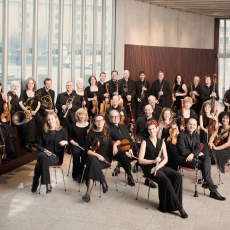Berlioz Symphonie Fantastique - SCO & Ticciati - Fanfare
Young conductor Robin Ticciati was a violin, piano, and percussion student who turned to conducting at age 15 at the encouragement of Colin Davis and Simon Rattle. He made his conducting debut in Brussels at the tender age of 19 (shades of Toscanini), and was named principal conductor of the Scottish Chamber Orchestra in 2009. Ticciati was only 26 when he recorded this disc.
My overall impression is extremely positive, and I'll try to explain exactly why. (Sometimes aural impressions are easy to put into words, sometimes not.) Although Ticciati takes what I would define as a modern view of this highly emotional and echt- Romantic symphony, meaning that the soft passages are beautifully phrased but do not have an undercurrent of passion and the loud passages are energetic but do not always reflect the composer's "opium dream" of various scenes and emotions (as Monteux did in his classic 1930 account, and Munch echoed in his equally classic Living Stereo version of 1962), he is very exciting and elegant in turn, and as a compensation for his sometimes emotional detachment he presents us with an almost x-ray view of the score. One not only hears inner voices and instruments that sometimes (but not always) pass unnoticed in the Monteux and Munch recordings (listen, particularly, to the upward violin glisses in the final bars of the symphony), but the exactitude with which his orchestra executes these tricky passages is so precise that there are times when one is left speechless.
Perhaps the most disappointing movement is "Un bal." Ticciati never quite gets the movement off the ground. It never takes wing and flies as it rightfully should, but instead gets bogged down in the precision of the playing. This is a ball in which dancers start and stop so many times that they never get caught up in the excitement of dancing. He is also extremely slow in his interpretation of "Scène aux champs," which is slow enough to begin with, thank you very much. Perhaps this is how Ticciati really feels the music; if so, I would suggest that he rethink his interpretation in the future. A bit more forward momentum and (you might say) nervous tension in his ball would be welcome, yet I would equally advise him to retain his extraordinary sound-picture-painting abilities.
And then we come to the pièces de resistance, the "March to the Scaffold" and the "Dream of a Sabbath Night." These movements are so powerfully produced, artfully shaped, and clearly articulated that they put every other recording I've heard of them to shame, and this includes two Colin Davis versions, two Munch versions, and various others (including Mitropoulos, Muti, Martinon, and Bernstein). Ticciati not only articulates the various difficult string passages (cellos and basses in the march, violins and violas in the Sabbath) in a way that no one else does, but also suggests greater power than his 64-piece chamber orchestra would be capable of. Again, I prefer a faster tempo in both of these movements than Ticciati gives us here, but that is a small complaint and in no way undermines his very substantial achievement as a chef d'orchestre. To a large extent, I'd compare Ticciati's skills at this point to those of the late Carlo Maria Giulini when he was young: an elegant, finely chiseled orchestral sound, first-class musicianship, but just sometimes lacking that extra spark that separates the truly great conductors from the very good. Giulini eventually made the leap to greatness. Ticciati is right on the brink of it; one can hear this in his overall approach, and I for one sometimes give in a little when reviewing studio recordings because they don't always reflect the way a conductor performs in concert. I'm not sure if he can take that last step from polished and highly skilled professional to outstanding interpreter. Nowadays, young performers who are fêted and pushed into early careers often don't develop further, but I hear greatness lurking under the surface with Ticciati. He's so close. He just needs to grow a little emotionally, and he'll be there.
The Béatrice et Bénédict Overture is the lightest and most fairy-like of all Berlioz's scores, and here Ticciati and the orchestra are fully in their element. No caveats need be made here; everything is spot-on, and they sound as if they're having a ball.
Overall, then, a very interesting disc. Because of the occasional emotional reserve, I cannot recommend this as a first choice for this symphony, but as a second recording in your library it would make a nice alternative. © 2012 Fanfare

